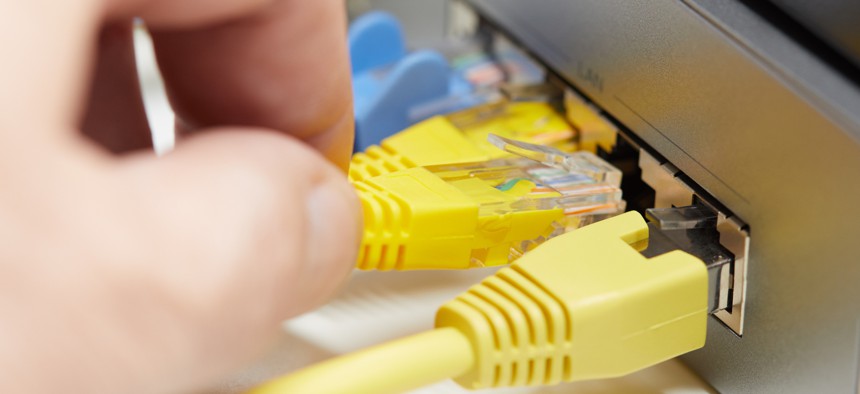Pressure mounts to extend low-income broadband subsidy

Thanasis/Getty Images
After the FCC released guidance on how it planned to wind down the Affordable Connectivity Program, more state and local officials are urging Congress to maintain funding.
A hugely popular subsidy to help low-income people afford broadband internet is set to run out of money soon, and a wild scramble is underway to try and replenish it, with mayors among those alarmed that the program’s expiration will exacerbate the digital divide.
The Federal Communications Commission announced earlier this month that the Affordable Connectivity Program, a $30-a-month subsidy to help low-income families pay for home internet service, will completely run out of money in April, with the program fully shut down the following month.
Nearly 23 million people are enrolled in the Affordable Connectivity Program, or ACP, an offshoot of the COVID-era Emergency Broadband Benefit, which was established under the 2021 infrastructure law with $14.2 billion allocated to help get low-income people online.
In a statement, FCC Chairwoman Jessica Rosenworcel said the infrastructure law “established a historic and unquestionably successful program to make broadband affordable, and we now appear on the brink of letting that success slip away.”
“Disconnecting millions of families from their jobs, schools, markets and information is not the solution,” she continued. “We have come too far with the ACP to turn back.”
President Joe Biden has requested $6 billion in additional funding from Congress for the ACP, which this administration said would extend the program through the end of the year.
Deirdre Mulligan, principal deputy U.S. chief technology officer in the White House’s Office of Science and Technology Policy, called the ACP the “cornerstone” of the Biden administration’s Internet for All policy during a committee meeting at the U.S. Conference of Mayors’ winter meeting last week.
Earlier this month, members of the U.S. House and Senate released a bipartisan, bicameral bill to extend the program and provide $7 billion in funding, which based on the Biden administration’s figures would ensure its survival well into 2025. Vermont Sen. Peter Welch, a Democrat and one of the bill’s cosponsors, said in a statement that “access to high-speed internet isn’t a luxury anymore, it’s a necessity.”
“That’s why it’s never been so important to avoid this funding cliff and extend the ACP,” he continued.
The legislation has received support from a variety of associations, businesses, nonprofits and government leaders. North Carolina Gov. Roy Cooper and a bevy of other state technology leaders released a joint statement urging the bill’s passage.
“We must address the high costs of internet service as our state continues to leverage historic federal investments in broadband infrastructure, so North Carolinians do not have to choose between the internet and other necessities,” North Carolina Department of Information Technology Secretary and State Chief Information Officer Jim Weaver said in a statement.
But its chances of passing are unclear. Republicans in both the House and Senate wrote to Rosenworcel in December with questions about the FCC’s administration of the ACP program, how it measures success and its overall “effectiveness.”
In the absence of a legislative extension, the FCC is already taking steps to wind the program down. A fact sheet says that no new enrollments will be accepted after Feb. 7, while enrolled households can expect to receive notices from their internet provider about the end of the program and the impact on their bill.
The ACP’s possible end has invoked a strong reaction among the nation’s governors and mayors, many of whom have seen thousands of their residents receive free or heavily subsidized internet, to extend it.
In a November letter to congressional leadership, a bipartisan group of 26 governors said there is “broad agreement” about the necessity of broadband internet in the modern world, and that closing the digital divide with programs like the ACP “transcends politics.”
Earlier this month, a bipartisan group of 174 mayors sent a letter to congressional leaders urging an ACP extension. The mayors said the program “has been a key tool in our efforts to eliminate the digital divide,” and noted its “wide support” across the country.
“This is truly a bipartisan issue,” said Seattle Mayor Bruce Harrell during the mayors’ winter meeting last week. “These devices of connectivity can change lives and change families and indeed change our cities.”






